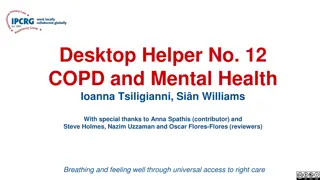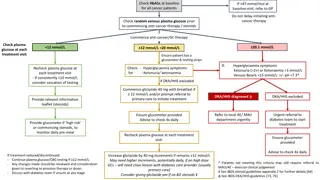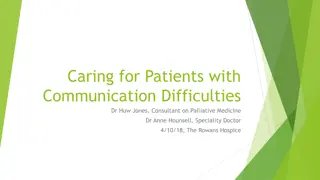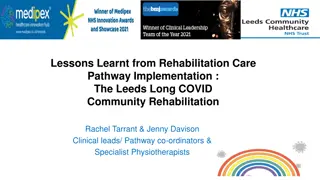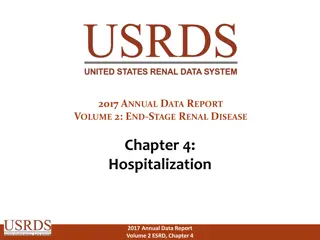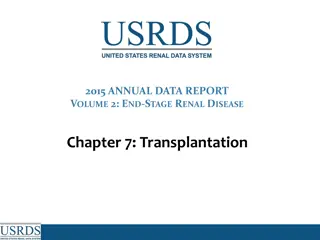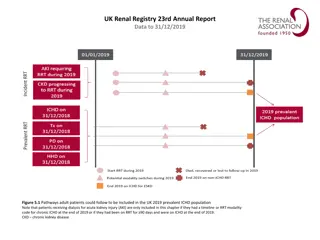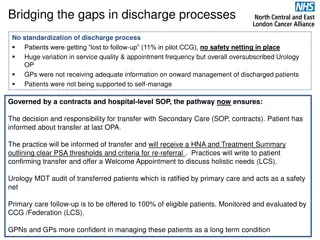
Understanding Challenging Patient Interactions
Learn how to manage challenging patients in healthcare settings, including identifying factors contributing to difficulty, responding appropriately, and understanding various types of difficult patients such as demanders and hypochondriacs. Explore provider and system factors that influence patient interactions to improve overall care quality.
Download Presentation

Please find below an Image/Link to download the presentation.
The content on the website is provided AS IS for your information and personal use only. It may not be sold, licensed, or shared on other websites without obtaining consent from the author. If you encounter any issues during the download, it is possible that the publisher has removed the file from their server.
You are allowed to download the files provided on this website for personal or commercial use, subject to the condition that they are used lawfully. All files are the property of their respective owners.
The content on the website is provided AS IS for your information and personal use only. It may not be sold, licensed, or shared on other websites without obtaining consent from the author.
E N D
Presentation Transcript
Managing Challenging Patients Managing Challenging Patients Kristy Engel, PsyD Kristy Engel, PsyD 1 |
Objectives Objectives Appreciate what can contribute to challenging interactions Identify provider, system, and patient factors Discern what might be contributing to the patient s presentation Identify ways to respond appropriately
Not challenging patients but challenging situations Not challenging patients but challenging situations In any type of service profession, you will likely come across difficult encounters with people What might cause someone to be difficult in one situation might be different than in others As many as 15 percent of patient-physician encounters are rated as difficult by the physicians involved Providers own attitudes and behaviors may also contribute to difficult encounters with patients Jackson JL, Kroenke K. 1999
Influences on the interaction Influences on the interaction Provider factors Caseload Burnout Level of experience/comfort Stimulus value Feeling angry or defensive Being distracted or time pressured Reacting in a condescending way Blaming the patient Health care system factors Staffing Cost/time pressure Space/environment https://www.mdlinx.com/internal-medicine/article/2981; Haas, et al., 2005
Types of Difficult Patients Types of Difficult Patients Demanders Characteristics: Never satisfied with their care Try to dictate their care Need faster response times to their concerns May be verbally abusive to staff May be a temporary reaction to severe pain or symptoms https://www.mdlinx.com/internal-medicine/article/2981
Types of Difficult Patients Types of Difficult Patients Hypochondriacs (AKA Frequent Flyers ) Characteristics: call all the time with new medical problems fixate on the miniscule symptoms not convinced when things are normalized tend to be comfortable in the sick role they often have doctor-shopped and likely have a history of multiple diagnostic tests and medication allergies https://www.mdlinx.com/internal-medicine/article/2981
Types of Difficult Patients Types of Difficult Patients Avoiders Characteristics don t return phone calls from the transplant team don t call the transplant team when something meets criteria warranting a call only call when there s a problem they perceived needs to be fixed https://www.mdlinx.com/internal-medicine/article/2981
Types of Difficult Patients Types of Difficult Patients Manipulators Characteristics play on the guilt of others, threatening physical harm, legal action or suicide get fixated on what they want in the moment and can be impulsive do not disclose important details during the evaluation that then impact the working relationship afterwards https://www.mdlinx.com/internal-medicine/article/2981
In the situation In the situation Steps for responding: 1. Self-examination 2. Understanding/appreciation for what might be contributing to the patient s presentation
Patient Factors Patient Factors Table 1: Common Psychosocial Issues Identified in Transplant Patients and Families Experiencing emotional highs and lows that are potential adverse effects of immunosuppressive agents, such as corticosteroids Stress and challenges due to complex posttransplant regimens including multiple medications and complicated dosing schedules, regular follow-up medical evaluations and laboratory tests, and lifestyle restrictions related to smoking, alcohol, and other potentially harmful substances Coping with physical changes and early complications, such as acute graft rejection Psychological acceptance of the transplant; for cadaver-donation recipients, this includes dealing with the circumstances that someone lost his/her life just when the transplant patient regained his/her own life Dealing with financial and economic issues, such as cost of transplant surgery, hospital stay, and/or follow-up care and medications Dew, et al., 2014
Patient Factors Cont. Patient Factors Cont. Anxiety Demanders- if I don t get what I perceive I need, something terrible is going to happen and I can t tolerate the limbo of not knowing Hypochondriacs - there s something wrong with me and no one is listening to me which makes my anxiety worse or if I was really fixed, I wouldn t still be having different symptoms so we need to address these symptoms Avoiders- uh oh- something must be wrong if the transplant center is calling and I don t wanna deal with bad news or having to go to the hospital or I know this doesn t feel right but if I call the transplant team, they ll just tell me to take more medication or go to the hospital .
Patient Factors Cont. Patient Factors Cont. Depression Avoiders- I know something doesn t feel right but who cares? I m sure it ll go away. Besides, I don t feel like getting off the couch to do anything about this Personality characteristics or disorder Demanders and Manipulators (borderline/narcissistic)- I need what I need right now and will do or say anything to get it or if they don t help me, they ll be sorry or I m paying for this time, they re here to serve me Hypochondriacs - (dependent)- I don t know if I m doing this right- I better check with my doctor Avoiders (avoidant)- this is probably nothing and if I call my transplant team, they ll just think I m overreacting and am stupid Presence of a substance use disorder
Step 3. Responding Step 3. Responding Acknowledge the situation (ex. I feel like we re getting off on the wrong foot ) Listen carefully to patient s concerns Use reflective listening to let the patient know you are hearing them Ask them to repeat back what they have heard Set clear boundaries, limitations, and expectations; put them in writing as needed (ex. more frequent appointments in order to obtain refills; expectations regarding on call usage) Use empathy and offer them extended help if they would like (ex. mental health referral if anxious and stressed) https://nurse.org/articles/dealing-with-difficult-patients; https://www.jacksonvilleu.com/blog/nursing/difficult-patients/
Step 3. Responding cont. Step 3. Responding cont. Document thoroughly Involve the family or trusted supports Consider behavior contracting May have to tell patients you cannot meet their needs and encourage them to find another provider (within institution or outside)
Conclusions Conclusions The nature of transplant work is that it can be emotionally charged There are multiple contributing factors to challenging interactions Being self-aware of your own contributions and stimulus value is important Appreciating what might be contributing to the patient s response is important Slow down and be purposeful in your response
Thank you! Thank you! Questions? Questions? 17 |



